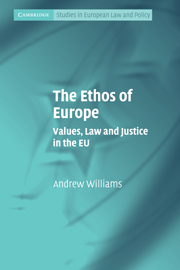4 - Human rights
Published online by Cambridge University Press: 05 June 2012
Summary
Introduction
When the European Economic Community was established in 1957, human rights did not figure in the political or legal landscape constructed by the Treaty of Rome. Their presence was at best subliminal. The subsequent claim by the European Court of Justice, the Commission, the Council, and now all institutions of the EU that human rights were fundamental in the EU's creation is a myth.
The institutional practice and constitutional framework that has developed over the past thirty or more years has, nonetheless, placed respect for human rights at the core of the EU's stated values. Not only is respect for human rights a prominent and explicit feature of the values now identified by the Lisbon Treaty of 2007 but it has also helped frame an array of other implicit constitutional themes. From constructing an identity for the EU, legitimising its operations, providing a bulwark against extremism and the abuse of power, to acting as a spur to ‘closer union’ between the peoples of Europe, human rights provide an iconic concept without respect for which the EU would lack moral and enduring substance. This remains true even with the adoption of the Lisbon Treaty.
My aim in this chapter is to consider the nature of the EU's commitment to human rights. This does not require a comprehensive review of the EU's record in relation to adherence to human rights standards.
- Type
- Chapter
- Information
- The Ethos of EuropeValues, Law and Justice in the EU, pp. 110 - 153Publisher: Cambridge University PressPrint publication year: 2010
- 1
- Cited by



